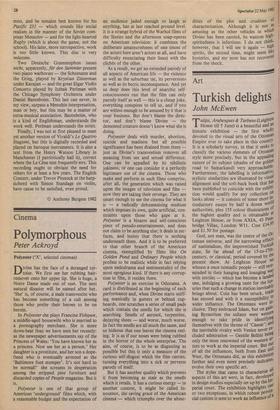Cinema
Polymorphous
Peter Ackroyd
Polyester ('X', selected cinemas)
Divine has the face of a deranged tor- toise. We first see her rubbing hair- remover onto her upper lip. She is huge, a Notre Dame made out of suet. The next natural disaster will be named after her. `She' is, of course, a male transvestite who has become something of a cult among those who prefer their heroes to be on heroin.
In Polyester she plays Francine Fishpaw, a middle-aged housewife who is married to a pornography merchant. She is more down-beat than we have seen her recently: as the newspaper advertisements say of the Princess of Wales: 'You have known her as a princess. Now see her as a person.' Her daughter is a prostitute, and her son a dope- fiend who is eventually arrested as the `Baltimore foot stomper'. It's not hard to be normal!' she screams in desperation among the stripped pine furniture and discarded copies of People magazine. But it is.
Polyester is one of that group of American 'underground' films which, with a reasonable budget and the expectation of
an audience jaded enough to laugh at anything, has at last reached ground level. It is a strange hybrid of the Warhol films of the Sixties and the afternoon soap-operas on American television: it combines the deliberate amateurishness of one (most of the actors here aren't actors at all, and have difficulty enunciating their lines) with the clichés of the other.
As a result, we get an extended parody of all aspects of American life — the violence as well as the suburban tat, its perversions as well as its hectic inconsequence. And yet so deep does this level of anarchic self- consciousness run that the film can only parody itself as well — this is a cheap joke, everything conspires to tell us, and if you are witless enough to be amused by it that is your business. But don't blame the direc- tor, and don't blame Divine — the demented creature doesn't know what she is doing.
Polyester deals with murder, abortion, suicide and madness but all possible significance has been drained from them just as Divine's transvestism removes all meaning from sex and sexual difference. One can be appalled by its nihilistic jokiness, or one can consider it a perfectly legitimate use of the cinema. Those who make and perform in such films comprise, after all, the generation which was raised upon the images of television and film now they are taking their revenge. They are smart enough to see the cinema for what it is — a radically dehumanising medium which imposes its own, quite artificial, con- straints upon those who gape at it. Polyester is a bizarre and self-conscious piece of pseudo-entertainment, and does not claim to be anything else; it deals in sur- faces, and insists that there is nothing underneath them. And it is to be preferred to that other branch of the American cinema, exemplified by films like On Golden Pond and Ordinary People which profess to be realistic while in fact relying upon melodrama and sentimentality of the most egregious kind. If there is any corrup- tion in film, it resides there.
Polyester is an exercise in Odorama. A card is distributed at the beginning of each performance and, when Divine starts sniff- ing manically in gutters or behind cup- boards, one scratches a series of small pads which contain the smells for which she is searching. Smells of aerosol, turpentine, decaying shoes — and worse, much worse. In fact the smells are all much the same, and so hideous that one leaves the cinema reel- ing. It is as if our noses were being rubbed in the horror of the whole enterprise. The aim, of course, is to be as disgusting as possible but this is only a measure of the curious self-disgust which the film carries, turning everything into a sick or perverse parody of itself.
But it has another quality which prevents it from becoming as stale as the smells which it retails. It has a curious energy — in another context, it might be called in- nocence, the saving grace of the American cinema — which triumphs over the absur-
dities of the plot and crudities of characterisation. Although it is not as amusing as the other vehicles in which Divine has been carried, its wanton high- spiritedness is infectious. I do not think, however, that I will see it again — high spirits, the second time, might seem like hysterics, and my nose has not recovered from the shock.






































 Previous page
Previous page